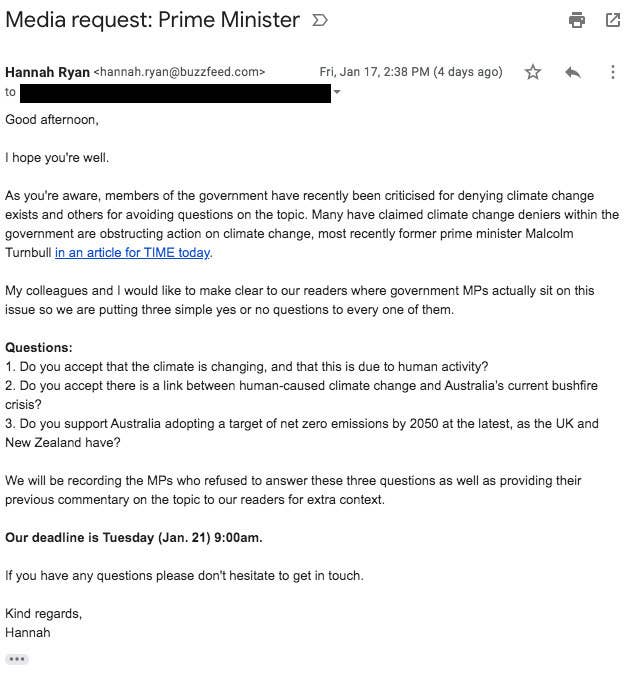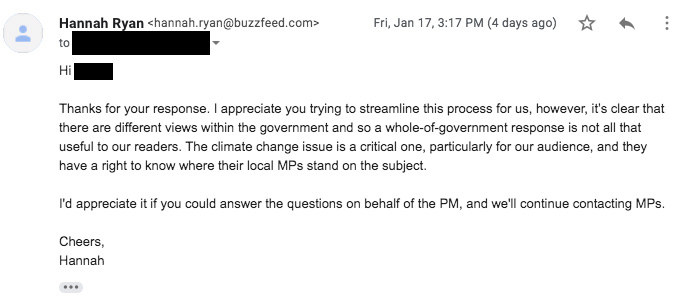
All but two of the Australian government’s 77 members of parliament have refused to put their personal views on climate change on the record, as the country continues to suffer through a deadly bushfire season.
Prime minister Scott Morrison and other senior ministers have insisted that the government accepts the science of climate change.
“The government has always made this connection [between climate change and its impact on weather] and that has never been in dispute,” Morrison told a press conference in early January.
But the claim of unity is undermined by public comments from several MPs, most recently Craig Kelly, who you might remember as the man berated as a "denier" during a spectacular car-crash interview with conservative Good Morning Britain host Piers Morgan.
In light of this confusion, BuzzFeed News set out to answer a simple question: where do the members of the Australian government actually sit on climate change?
Our reporters approached each of the 77 Liberal and National lower house members to get their views on the science of climate change, its connection with the bushfire crisis and whether Australia should adopt a zero net emissions target by 2050.
Only one responded with his personal views on the three questions. Energy and emissions minister Angus Taylor responded with a statement on behalf of the government. The other 75 representatives failed to respond at all.
The sole individual responder, Nationals MP Damian Drum, was equivocal.
Drum, who represents the Victorian electorate of Nicholls and is the party’s chief whip, accepted that humans "are playing a role" in a changing climate, but said there were also other factors at play.
He said that while the bushfire crisis is linked to a changing climate, forest management and roadside fuel reduction are having a bigger impact.
Morrison’s media advisor replied to BuzzFeed News’ questions to say only that Taylor would be responding on behalf of the government.


When BuzzFeed News pushed for an individual answer, he replied: "The Prime Minister has answered those questions already."


The emailed statement from Taylor said: "The science on man-made climate change is clear: it is playing a role in driving increasing temperatures, more severe droughts and longer fire seasons.
"It has undoubtedly been a factor behind this season’s unprecedented fires — along with the drought, how land is managed, the way hazard reduction burns are planned and carried out, the locations where homes are built and the building materials used."
Taylor added that climate change was driven by global emissions, not the emissions of any one country.
The popular view that a small group of far-right climate sceptic MPs are preventing meaningful action on climate change has dogged the Morrison government.
Last Friday, Morrison’s predecessor Malcolm Turnbull put it bluntly in an essay for TIME Magazine: in Australia, the climate change issue has been "hijacked" by a "toxic, climate-denying alliance" of right-wing politics and media, and vested business interests.
Turnbull blamed his 2018 leadership loss on a right-wing minority in his party room, whom he claimed “sabotaged” his efforts to address climate change and then brought down his government.
The Labor opposition has also accused the government of kowtowing to climate deniers among its ranks. Speaking to ABC radio last week, shadow defence minister Richard Marles suggested that "half of its caucus [denies] the existence of climate change".

Craig Kelly — who said on Good Morning Britain earlier this month there was “no link” between climate change and the bushfires — might be the most prominent sceptic, but he is far from the only government MP to doubt the science of climate change.
For example, Nationals MP George Christensen has blamed the fires on “man-made arson” but denied they are due to “man-made climate change”.
In 2019, Liberal Celia Hammond said humanity’s contribution to climate change was "very minimal".
Fellow West Australian Andrew Hastie described himself in 2017 as a "climate realist" rather than a sceptic, saying the most important question was "how do we secure reliable and affordable energy for all Australians?" and that "everything else is secondary to this duty of government."
Queensland Liberal National MP Llew O’Brien said in 2019 that “the planet’s climate has always changed”. Last week he said a more ambitious emissions reduction target would be "pure symbolism at the expense of the economy".
On the opposite side of the ledger, a small number of MPs including Steve Irons and Nola Marino have been clear that they accept the science and urgency of climate change.
More commonly, Coalition MPs avoid publicly questioning climate science, but emphasise a love of coal — a significant contributor to carbon emissions. The Australian coal industry is frequently invoked to justify going slow on emissions reductions.
In 2017, then treasurer Scott Morrison famously brought a lump of coal into Australia’s parliament, mocking the opposition's arguments for a transition to renewable energy. “Don’t be afraid, don’t be scared, it won’t hurt you, it’s coal,” he said.
Other government politicians' views are impossible to ascertain — either because they have said nothing, or because they are Barnaby Joyce.
Merry Christmas
The government has committed to an emissions reduction target of 26-28% by 2030. However, it is relying on carryover credits from the Kyoto protocol, which the opposition has described as an accounting trick.
In recent weeks, Morrison has adjusted his rhetoric to suggest the government will "meet and beat" this target, but has not changed the policy itself.
What we asked
Each MP was sent three yes/no questions:
1. Do you accept that the climate is changing, and that this is due to human activity?
2. Do you accept there is a link between human-caused climate change and Australia's current bushfire crisis?
3. Do you support Australia adopting a target of net zero emissions by 2050 at the latest, as the UK and New Zealand have?
How each MP responded
Damian Drum:
1. I certainly accept that the climate is changing, and I believe that humans are playing a role in that changing climate. However, it must also be noted that many, many scientists also believe that there are other factors at play in our changing climate in addition to human activity.
2. I accept that there is a link between our changing climate and our current bushfire crisis. However, our drier climate is not having as big an impact as forest management and roadside fuel reduction.
3. The UK currently has around a 20% reliance on nuclear energy and I don’t think anybody is advocating that Australia take up reliance on nuclear energy. I am not supportive of net 0 emissions by 2050, simply because I think it will have an extremely negative financial impact on so many Australian households.
Angus Taylor (relevant parts of statement):
The science on man-made climate change is clear: it is playing a role in driving increasing temperatures, more severe droughts and longer fire seasons.
It has undoubtedly been a factor behind this season’s unprecedented fires — along with the drought, how land is managed, the way hazard reduction burns are planned and carried out, the locations where homes are built and the building materials used.
Climate change is driven by global emissions, not by the emissions of any one country.
Literally everyone else:



